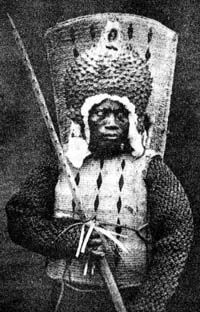| Nauruan Civil War | |||||||||
|---|---|---|---|---|---|---|---|---|---|
 Photo of a Nauruan warrior in the Nauruan Civil War around 1880 wearing traditional battle armour. | |||||||||
| |||||||||
| Belligerents | |||||||||
| King Aweida loyalists | Anti-Aweida rebels | ||||||||
| Commanders and leaders | |||||||||
| King Aweida of Nauru [1] | Unknown rival claimant [1] | ||||||||
| Units involved | |||||||||
| Loyalists | Rebels | ||||||||
| Casualties and losses | |||||||||
| Nauruan population reduced from 1400 to 900, a 36% decrease in the population. [2] | |||||||||
The Nauruan Civil War was fought from 1878 to 1888, between forces loyal to incumbent King Aweida of Nauru and those seeking to depose him in favour of a rival claimant. The war was preceded by the introduction of firearms to the island and its inhabitants, Nauruans, as a whole. For the majority of the war, the loyalists and the rebels found themselves in a stalemate, with one side controlling the northern and the other the southern part of the island.
Contents
- Background
- Timeline
- Outbreak
- War reports
- German annexation and end of the war
- Aftermath
- See also
- References
In 1888, the German Empire intervened by restoring Aweida to the throne and confiscating combatants' firearms; by the time they finished, the German soldiers had confiscated 791 rifles from both belligerents, nearly one gun for every remaining living adult inhabitant of the island. By historical estimates, Nauru had a population of approximately 1,400 in 1848; by the end of war, there were about 900 inhabitants. [2]
Having effectively been put under German control with the civil war's ceasefire, Nauru was shortly thereafter annexed into the German colonial empire. It became a distinct polity within German New Guinea in 1906 and it was subsequently captured by the Australian expeditionary force in 1914, at the outbreak of World War I.

